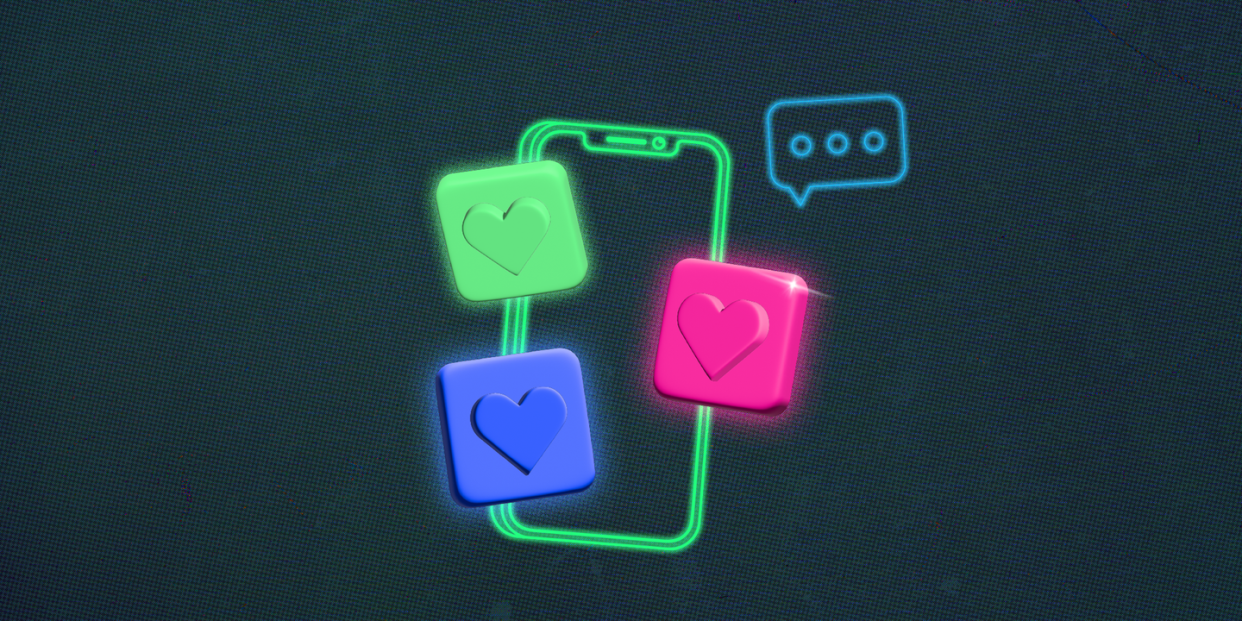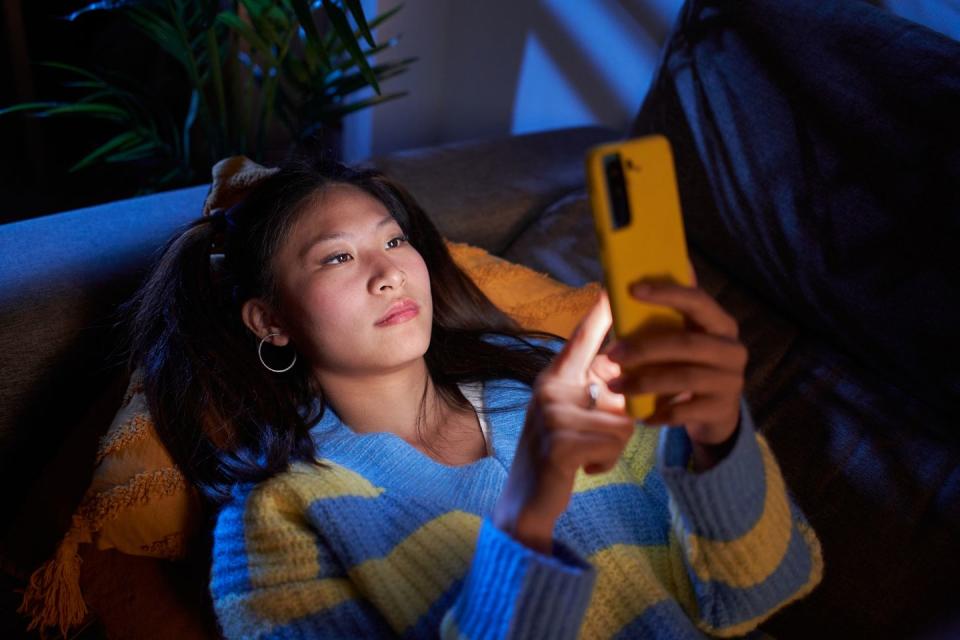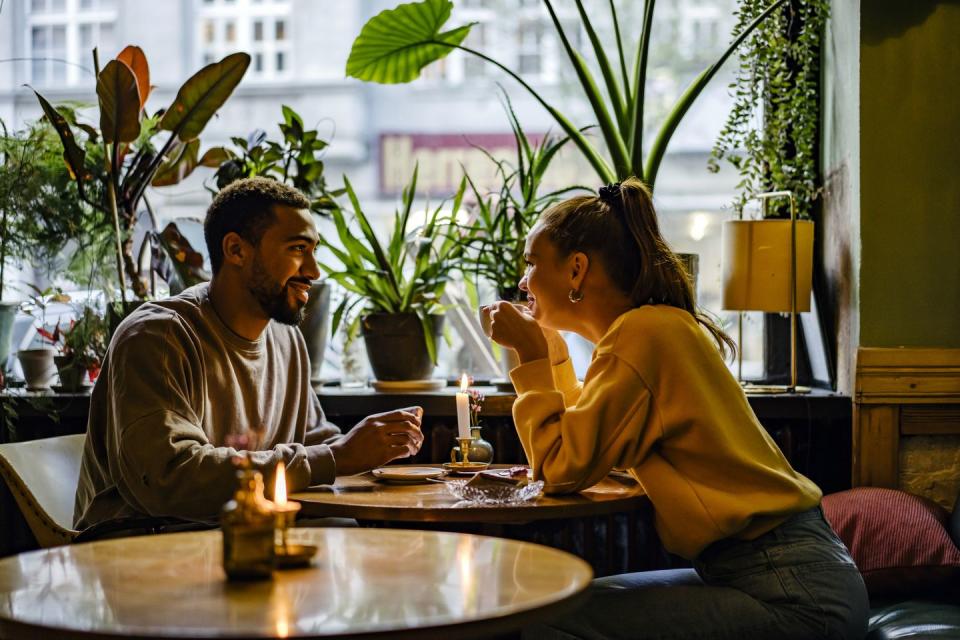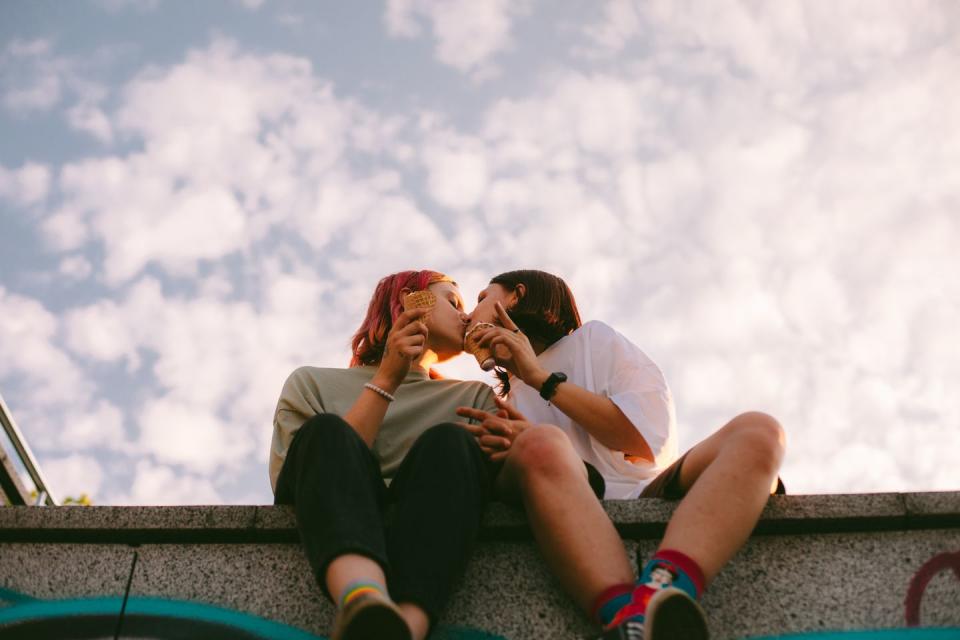Can we trust the new dawn of dating apps?

Did you know that dating apps are dead? They died in 2016. Then again in 2019, and 2022, and 2023, and, er, 2024. And from beyond the grave, they’re responsible for killing hook-up culture, romance, and love in general. Bleak, right?
Hyperbole aside, dating apps have indeed fallen out of favour in recent years. Research shows that 90% of Gen Z are frustrated with the apps, while 80% of long-term users have experienced dating app fatigue or burnout. Even worse, a 2023 survey found that almost half (46%) of Brits say their dating app experiences have been bad. This is having tangible effects, too. Despite seeing a boom during the pandemic (because, well, duh), a recent study found that 79% of respondents don’t use dating apps regularly. This tracks with stats from the apps themselves, which are seeing a decline in both users (Tinder’s dropped by 5% in 2021) and shares.
And how are we all coping? Very normally, obvs. Determined to loosen dating apps’ grip on our love lives, we’re now coming up with increasingly convoluted techniques to navigate today’s turbulent dating landscape. Encouraged by TikTok, single people are taking vows of celibacy, young women are going ‘boy sober’ and pausing their dating lives, and many are choosing to ‘decentre men’ by embracing South Korea’s ‘4B movement’, which renounces dating and sex with men, marriage, and having children. At the same time, we’re joining running clubs to see if we can chase down a lover, going to therapy to ‘heal’ ourselves so we’re suitable for dating, and deferring to 90s self-help books for dating advice. Oh, and speed dating is back.

Yet, no matter how much we seem to hate dating apps, we still continue to swipe. As of last year, more than one in 10 UK adults were using online dating services, with Tinder (2.49 million users), Hinge (1.51m), Bumble (1.44m), Grindr (924k), and Plenty of Fish (625k) being the most popular choices. Because, while swiping in abject misery may seem self-flagellating, if you want to find love (and don’t fancy your luck on reality TV), it can feel like there isn’t really another way to go about it. The working-from-home revolution means that office romances are off the cards for many; the cost of living crisis has made the pub too expensive to chirpse in; and one in three young people in the UK are socialising less.
Of course, it’s not all doom and gloom; many people do meet their long-term partners on dating apps, whom they likely wouldn’t have met offline. In fact, recent figures show that between 2015 and 2019, 32% of relationships started on the internet, and it’s predicted that by 2035, more people will meet their partners online than off. For better or worse, it’s these success stories that keep everyone else swiping.
So, dating apps prevail. And as long as they sell the dream of a happily-ever-after, we’re going to continue buying it – whether it works or not. If we’re stuck with them, then, what do we actually want from them?
False promises
Online dating has existed since 1995, with the launch of Match.com. Dating apps as we know them, though, began with Tinder’s arrival in 2012. No longer seen as a depressing amusement park for widows, divorcees, or the ‘unlucky in love’, the world of online dating suddenly opened up to a younger generation of horny teens and 20-somethings. Although most of these users had plenty of opportunities to meet potential partners offline, Carolina Bandinelli, an associate professor at The University of Warwick who studies romance and digital culture, says that dating apps’ immediate (and ongoing) appeal was in their “illusion of choice”. Why settle for the boys at uni when there’s a world of eligible bachelors in your phone?
“Dating apps promised an efficient tool to navigate the dating scene,” Bandinelli tells Cosmopolitan UK. “They created this utopia of dating that’s transparent and efficient – a digital space dedicated to meeting potential partners.”
Dating app companies claimed to have created an algorithm that cracked the secret to love – or, as eHarmony put it, they were the “brains behind the butterflies”. “When you think about Tinder’s tagline, ‘Match, chat, date’, it was saying, ‘Look, it’s easy, the messiness of love can be broken down into three simple steps’,” continues Bandinelli. “They promised this, but it didn’t work. And now people are realising that. That’s a huge contradiction that dating apps will have to tackle, because a dating app is only sustainable as long as it doesn’t fully work; if everyone found someone, then the app would be redundant.”
This hasn’t been lost on users, who, over the years, have been asked to pay more and more in subscription fees in order to have the best chance of finding love. In February, six men filed a lawsuit against Match Group – the parent company of some of the biggest dating apps, including Hinge, Tinder, and OKCupid – alleging that the company’s dating apps are designed to get users addicted, encouraging “compulsive” usage and locking them into a “perpetual pay-to-play loop”. Match Group said the lawsuit is “ridiculous” and that their “business model is not based on advertising or engagement metrics”.
But the users’ complaints may not be wholly unfounded; dating apps have gamified love, encouraging us to optimise the experience and treat all individuals – including ourselves – as commodities. Besides, there’s still no scientific evidence that dating apps actually increase your chances of finding your ‘soulmate’.
“It’s a good sign if people are becoming suspicious, or even starting to reject the idea that dating apps are the default option,” says Bandinelli. “That doesn’t mean dating apps have to die – after all, there’s always been matchmakers, whether that’s wedding agencies or ‘lonely hearts’ ads in newspapers – but maybe it’s time they updated their business models.”
Over the last few years, business-savvy entrepreneurs have been gleefully watching the laboured downfall of mainstream dating apps, ready to pounce with new apps that claim to address complaints and offer something different; Feeld’s journey from an alternative to a mainstream app is a good example of the demand for this. There’s specific and niche apps, like the recently-launched Mattr for those with autism and ADHD, Fitafy, a fitness dating app, and Playdate for single parents. There’s apps that try to solve the problems created by other dating apps (like ghosting and dead-end conversations) like thursday, which only allows you to use it for 24 hours per week. There’s also a host of AI-powered apps, which optimise the dating experience by offering matchmaking, conversation prompts, and even chatbots that do the talking for you.
“AI is definitely impacting how we date online,” says Roman Khaves, the co-founder of RIZZ, an AI ‘wingman’ that generates opening lines, bios, and tailored responses to conversations. It also scans your camera roll to pick your most flattering photos. “Today, a lot of the work is done by the user – they have to do all the swiping, they have to pick the right photos. AI is going to remove all of that heavy lifting and make the matchmaking process much easier. I see a future where AI will be like your best friend. It’ll learn everything about you – your conversation style, your sense of humour, what your tastes are, and who you’re compatible with.”
Although some aspects of AI-enhanced dating are pretty dystopian, there’s clearly demand for apps like RIZZ, which boasts four and a half million users, most of whom are Gen Z. “People are telling us that RIZZ is helping them feel more confident on dating apps,” continues Roman. “Before, if they wouldn’t know how to open a conversation, they’d say, ‘Hey’, or, ‘How’s it going?’, but with RIZZ’s suggestions, now they feel more creative.”
The sceptics among you might observe the irony in all of this. These fledgling apps purport to ‘solve’ a new set of love-related problems that were created by dating apps in the first place.
Even more ironic: faced with stiff competition, mainstream apps are also having to adapt to fix these problems of their own making. That’s not to say their aim – to give users a better, safer, and happier experience – isn’t worthwhile. Hinge just introduced its new ‘Hidden Words’ feature, which allows daters to filter out words, phrases, or emojis that they don’t want to see in their inboxes. If a potential match ‘likes’ you, but sends, say, an aubergine emoji, which is in your blocked terms list, they’ll be moved into a separate category for you to review, delete, or simply ignore. Tinder recently announced its new ‘Share My Date’ feature, which lets users share their date plans – including location, date, time, and a photo of their match – directly with friends and family from the app.
Meanwhile Bumble, which was a disruptor in the space as a ‘women-first’ app, has just announced a major change to its MO with the launch of ‘Opening Moves’, a new feature that gives women the option to set a question that their matches can respond to, rather than having to make the first move themselves. The app is also making its profile creation quicker and more intentional: shared interests are highlighted at the top of profiles, and dating intention options now include everything from ‘fun, casual dates’ and ‘intimacy without commitment’ to ‘life partner’ and ‘ethical non-monogamy’. It has also updated its compatibility algorithms, giving users a daily set of four curated and relevant profiles based on preferences and past matches.
“We know that control is important and that’s why many people choose Bumble, but we also hear that the demands of dating apps can be overwhelming,” CEO Lidiane Jones tells Cosmopolitan UK. “This first step in our evolution is a reflection of our community feedback. People want more clarity on intentions, better ways to showcase compatibility, and different ways to start the conversation.”
Updates like these are generally met positively by users, but is it enough?
What users want
While apps are evolving and changing, users themselves are changing how they use apps. “Dating apps are now being used as a more general form of social media,” says Brian Heaphy, a professor of sociology at The University of Manchester, who’s currently researching dating app use in relation to the pandemic. “Loneliness is a key issue here. People aren’t just looking for romance or sex, they’re also looking for friendship and a less lonely life.” Heaphy believes that apps offering localised matching or meet-ups will become increasingly attractive to daters looking for “human connectedness”.
Connection is key. “I’d love to meet some compatible people who are looking for the same thing as me, and hopefully move forward with someone in my life,” says 32-year-old Phoebe* from Leicester, who’s recently returned to dating apps for the first time in almost a decade. “Now I’m in my 30s, I feel this overwhelming pressure to find the right person, and it’s great that I don’t have to go out all the time to meet people, but people do not reply on dating apps. Ghosting is too easy. I don’t remember that so much from [when I was on them] before. More accountability would be good. It’s no fun messaging with people you’ve matched with, only for it to go nowhere.”
This is a sentiment as old as, well, dating apps themselves, and it’s echoed by a number of daters who spoke to Cosmopolitan UK, who are looking for more personal and meaningful interactions – something dating apps in their current form can’t necessarily provide. “So much of the current online dating world is geared towards quick connections,” says 20-year-old Tristan from London. “I’ve read about people’s personality types, their zodiac signs, their pets, and even found out their Instagram handles all before I’ve ever heard them speak. These mechanical ways of meeting people aren’t normal.”
“No one wants to work at anything,” adds 27-year-old Maria* from London, who’s been single for eight years. “Everyone’s expecting an incredible spark straight away. With guys I’ve dated in the past, it feels like they’ve got one eye on me and one eye looking out for something better. This is an attitude the apps have instilled.”
There’s a fundamental problem frequently voiced about the very premise of dating apps. Specifically: can you ever build a real connection with someone if you’re only talking to them because of their looks? Sure, you might go over to someone in a bar because you fancy them, but in an IRL interaction, you can more easily get a sense of a person’s personality – it’s harder to achieve that when they’re 2D. And CV-esque bios and forced prompts don’t necessarily help. “Despite dating apps’ attempts to add prompts and questions to interact with, it’s all still primarily about how you look in five pictures,” says Maria. “Surely someone can come up with a way to match people on their goals and interests?” She references eight, an invite-only dating concept in London, which asks daters to fill in a form, and then invites them in groups to small in-person events based on their similar goals and interests.

Paired also comes to mind – an app which features a questionnaire for people already in couples to learn more about each other’s desires “I like the swipe to see if I’m attracted to someone,” says Zoe*, 26, from London, “but when it comes to deeper connections, opinion-based matching could make for a better start.”
Although dating apps have always followed a format that prioritises instant gratification and the never-ending swipe, the novelty has worn off. Some people have been using dating apps for over 10 years; they’ve gotten older, their priorities have changed, and, along the way, they’ve become increasingly jaded with the process. The pandemic’s impact is still palpable. Not only did dating app use increase during lockdown, but the way we used them changed, too. Unable to meet in-person, daters were forming deeper connections with less people, speaking more candidly, and allowing themselves to be more vulnerable, including by experimenting with video dates. Now that they’ve had a taste of what could be, many dating app users don’t want to settle for less.
Where do we go from here?
According to a recent report by strategic foresight agency The Future Laboratory, video-first dating apps are the future. There’s new apps like Candid, which asks users to answer Hinge-style prompts via TikTok-style short videos, and Ditto, a video speed dating app. “This reflects how younger users are becoming more disillusioned with the lack of perceived authenticity from dating app users,” Simar Deol, foresight analyst, writes in the report. “Video features will make consumers feel as though they can develop enhanced and meaningful relationships on another level.” It’s not just new apps either – Bumble launched in-app video and voice calls back in 2019, Tinder’s video dating arrived in 2020, and Hinge introduced its video prompt feature in 2022. While this may entice younger users, it’s likely to be bad news for Millennials or older daters, who aren’t so au fait with speaking to camera.
But whether you like it or not, dating apps are here to stay, and online dating is likely to remain the norm for years to come. They might go out of fashion or find new forms among younger generations, but those already on them are too deep in to give them up. “There’s a perception that dating apps are the primary way to meet people now,” explains Heaphy, “so even if you’re still going to clubs, pubs, bars, and so on, you’re not necessarily seeing that as an environment in which someone will make a move.”
In response to this feeling, a number of new dedicated singles events are springing up, with attendance growing by 42% between 2022 and 2023, and another 20% over the last six months (as revealed by Eventbrite). Apps themselves are jumping on the trend, with the launch of meet-ups like Bumble IRL and Feeld socials. Dating apps, it seems, refuse to be left behind.
“I’m confident that Bumble will continue to play a key role in our future connections, both romantic and platonic, but we need to continuously evolve to meet the needs of our community, and especially women, today,” says Jones. “Dating is an emotionally vulnerable process and this is a responsibility that we don’t take lightly.”

Despite their voiced frustrations, none of the daters Cosmopolitan UK spoke to want to see their demise – and only Tristan says they’ve given them up for good. Whether they’re optimistic or not is a different story, but they all accept that dating apps are here to stay. “I have to feel positive otherwise I’ll cry,” says Phoebe. “I’m determined to approach dating apps with an open mind, and I’m willing to put in the hours. I know it’s time-consuming, but at least it enables me to have dinner parties with friends, movie nights with my sister, and to go away for the weekend, and still have time to meet someone. I feel like lots of people are in the same boat and don’t want to give up their life to dating or going out all the time. So, dating apps are still the way forward in my eyes.”
Maria, meanwhile, is hopeful that users’ issues will be listened to. Although she says she’s “basically lost all hope” that she’ll find someone on an app, she’s excited by the number of new dating organisations springing up, like in-person singles events. “I’m manifesting a meet-cute, or for someone to talk to me on the tube,” she says. “But I still won’t delete the apps. I guess it’s just reassuring to know that I’m not alone in these feelings.”
*Names have been changed.
Additional reporting by Lois Shearing.
You Might Also Like

